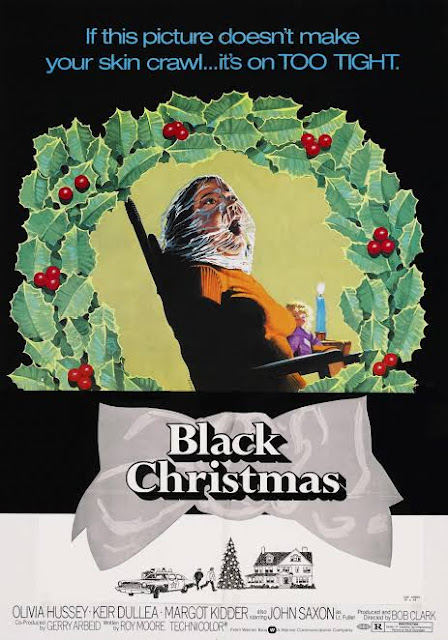A group of sorority sisters are being terrorised by strange phone calls.
What they do not realise is that the caller is already inside the sorority house…
Black Christmas is remarkable in a number of respects.
Historically, it is regarded as one of the first slashers.
On first viewing, what stands out about Black Christmas is that it feels fully-formed as an example of the genre.
There is nothing embryonic about it, even in terms of basic elements:
The group of sexed-up young people in an isolated location
The unseen killer signalled by a POV camera
Beyond those aspects, Black Christmas stands on its own terms. If it had not led anywhere, it would still be a fantastic horror movie.
While it is generally the subtext of a lot of slashers and horror films, Black Christmas treats misogyny as its central theme.
There is nothing metaphorical about it.
There is an underlying distrust of women’s bodily autonomy - Mr Harrison (James Edmond), the conservative father of a missing student, disapproves of the sorority’s more overtly sexuality; the police desk sergeant ignores Barb’s (Margot Kidder) complaint about the phone stalker because she has been drinking; while Jess (Olivia Hussey) wants to get an abortion, which brings her into conflict with her boyfriend Peter (Kier Dullea).
Even the killer seems to be obsessed - he constantly refers to a child, and arranges one of his victims in a rocking chair with a doll in her arms.
In terms of visual style, Black Christmas manages to use the lush green and red associated with Christmas as the contrast to deep shadow and harsh cool blues of the environment outside the sorority house, while the attic is framed in tight shots, filled with shadows.
The killer is only glimpsed in brief close ups of an eye.
His voice is a combination of actor Nick Mancuso and other performers, lending the character a terrifying unpredictability.
The killer is never defined, with the only clues in his ranting monologues about a baby named Agnes.
Despite the lack of steadicam, the filmmakers make savvy use of the handheld camera’s limitations to simulate the killer’s jerky movements (accentuated by a fish-eye lens).
While the film is scary, Black Christmas benefits from a wonderfully idiosyncratic cast of characters and sense of humour:
Margot Kidder is great as Barb, showing no patience for the staid environment around her. She is also the instigator of the film’s best joke, involving a new telephone exchange.
Special kudos to Mrs Mac (Marian Waldman), the sorority house mother, who spends the film smuggling booze around the house.
Bob Clark would go on to make the holiday classic A Christmas Story, and you can see the seeds of that film in Black Christmas’s satire of clueless adults.
Genuinely terrifying and hilarious, Black Christmas may have started a genre, but it is one of a kind.

No comments:
Post a Comment